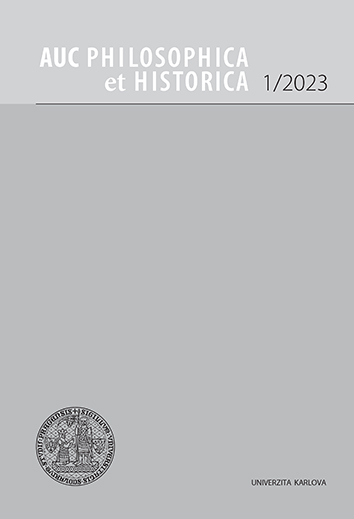AUC Philosophica et Historica je víceoborový akademický časopis zaměřený na humanitní a společenskovědné obory (filozofie, psychologie, pedagogika, sociologie, obecné, české a hospodářské dějiny, pomocné vědy historické a archivnictví, etnologie).
Časopis je indexován v databázích CEEOL, DOAJ a EBSCO.
AUC PHILOSOPHICA ET HISTORICA, Vol 2016 No 2 (2016), 97–113
Úvahy o roli veřejnosti v politické sféře a počátky průzkumů veřejného mínění
[Reflections on the Role of the Public in the Political Sphere and the Beginnings of Public Opinion Polling]
Lucie Smolařová
DOI: https://doi.org/10.14712/24647055.2016.17
zveřejněno: 29. 09. 2016
Abstract
This article focuses on discussions about the role of the public in the political sphere presented in the writings of philosophers and scholars examining public opinion and American democracy during the 19th and early 20th century, as well as on the political and social context that significantly influenced the beginnings of public opinion polling. In the 1930s, public opinion polls were introduced in response to the need to measure public sentiments that mainly emerged from discussions about the role of the public in American democratic governance and modern society, which were based on the European philosophical tradition and contradictory thoughts about the role of the people in the political sphere traceable to Antiquity. Gallup and other early practitioners of public opinion polling believed that polls were a tool that could significantly enhance American democracy; however, both the methodology and concept of public opinion polling have been heavily criticized since the introduction of polls. The link between the beginnings of polling and the discussions about the contours of American democracy was neglected for quite a long time.
klíčová slova: Public opinion polling; democracy; James Bryce; Walter Lippmann; John Dewey; George Gallup
reference (25)
1. Berinsky, A. J. (2006). American Public Opinion in the 1930s and 1940s: The Analysis of Quota-Controlled Sample Survey Data. Public Opinion Quarterly, 70(4), 499–529. CrossRef
2. Blumer, H. (1948). Public Opinion and Public Opinon Polling. Americal Sociological Review, 13(5), 542–549. CrossRef
3. Bryce, J. (1995). The American Commonwealth. Indianapolis: Liberty Fund.
4. Cole, G. D. H. (1923). Introduction. In J. J. Rousseau (ed.), The Social Contract and Discourses (pp. 6–31). London: J. M. Dent and Sons.
5. Crespi, I. (1989). Public Opinion, Polls, and Democracy. Boulder: Westview Press. CrossRef
6. Crespi, I. (1997). The Public Opinion Process: How the People Speak. Mahwan: Lawrence Erlbaum Associates.
7. Curtis, M. (1998). Introduction to the Transaction Edition. In W. Lippmann (ed.), Public Opinion (pp. xi–xxxvi). New Brunswick: Transaction Publishers.
8. de Tocqueville, A. (2010). Democracy in America: Historical-Critical Edition of De la démocratie en Amérique. Indianapolis: Liberty Fund. CrossRef
9. Dewey, J. (1954). The Public and Its Problems. Athens: Swallow Press.
10. Gallup, G. & Rae, S. F. (1940). The Pulse of Democracy: The Public-Opinion Poll and How it Works. New York: Simon and Schuster.
11. Herbst, S. (1995). On the Disappearance of Groups: 19th- and Early 20th-Century Conceptions of Public Opinion. In T. Glasser & Ch. T. Salmon (ed.), Public Opinon and the Communication of Consent (pp. 89–104). New York: The Guilford Press.
12. Korzi, M. (2000). Lapsed Memory? The Roots of American Public Opinion Research. Polity, 33(1), 49–75. CrossRef
13. Le Bon, G. (2001). The Crowd: A Study of the Popular Mind. Kitchener, Ontario: Batoche Books.
14. Lippmann, W. (1998). Public Opinion. New Brunswick: Transaction Publishers.
15. Lippmann, W. (1930). The Phantom Public: A Sequel to Public Opinion". New York: The Macmillan Company.
16. McDowell, G. L. (1995). Introduction. In J. Bryce (ed.), The American Commonwealth (pp. xi–xxx). Indianapolis: Liberty Fund.
17. Ritchie, D. E. (1992). Foreword. In E. Burke (ed.), Further Reflections on the Revolution in France (pp. vii–xx). Indianapolis: Liberty Fund.
18. Rousseau, J. J. (2002). O společenské smlouvě neboli o zásadách státního práva. Dobra Voda: Aleš Čeněk.
19. Schudson, M. (2008). The Lippmann-Dewey Debate" and the Invention of Walter Lippmann as an Anti-Democrat 1985–1996. International Journal of Communication, 2(0), 1031–1042.
20. Smith, T. W. (1990). The First Straw?: A Study of the Origins of Election Polls. Public Opinion Quarterly, 54(1), 21–36. CrossRef
21. Smolařova, L. (2015). Průzkumy veřejného mínění v Číně (Diplomova prace, Univerzita Karlova v Praze).
22. Soukalova, K. (2015). Historicky vyvoj konceptů famy a veřejneho miněni". Historická sociologie, 2015(1), 95–114. CrossRef
23. Sproule, M. J. (1997). Propaganda and Democracy: The American Experience of Media and Mass Persuasion. Cambridge: Cambridge University Press.
24. Tretera, I. (2002). Nástin dějin evropského myšlení: Od Thaléta k Rousseaovi. Praha: Paseka.
25. Warren, K. F. (2001). In Defense Of Public Opinion Polling. Boulder: Westview Press.
vychází: 2 x ročně
ISSN: 0567-8293
E-ISSN: 2464-7055
